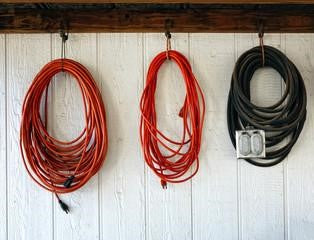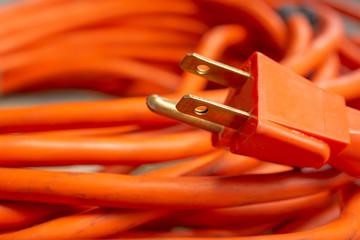

Weathering the Elements: The Impact of Climate on Outdoor Extension Cords

The Electrical Safety Foundation International (ESFI) reports that up to 51,000 home-related fires occur annually due to electrical faults. These incidents resulted in over 1,400 injuries, 500 deaths, and more than $1.3 billion in property damage.
Now, electrical malfunctions are completely unavoidable. However, choosing the right electrical components, such as extension cords, might help lower the risks or mitigate their severity in the event of occurrence.
The right extension cord can also prolong the longevity of the electrical appliances connected to it. This may further reduce the need for costly repairs and maintenance.
Extension cords fall into various categories. The components may be classified as indoor or outdoor based on their intended usage.
In this article, we narrow down our attention to outdoor extension cords and how their performance may be hampered by the weather. But first, let’s start from the beginning by understanding what extension cords are.

What Is an Extension Cord?
An extension cord is a length of flexible electrical power cable that features a plug on one end and at least one socket on the other. The device goes by many other names, including extension cable, power cord, extension lead, and power extender.
Most extension cords help supply electricity from the wall socket to appliances. The cable may be any length depending on the distance between the nearest power outlet and the electrical equipment to be powered.
What Is an Outdoor Extension Cord?
Outdoor extension cords are pretty much what the name implies - power extenders designed to be used outside instead of inside a building.
An outdoor extension cord must have certain features that qualify it for outdoor applications. Most of these cables can be useful in any outdoor environment. However, some have additional specs that make them ideal for more extreme weather.
Outdoor power extenders also differ depending on the specific appliances they’re designed for. For instance, an extension lead meant to power outdoor lighting may not be unsafe for heavy-duty applications like operating lawnmowers.

How Does the Weather Affect Outdoor Extension Cords?
Outdoor extension cords undergo wear and tear at different rates depending on specific environmental factors. Below are the major weather elements and how they can impact the performance of outdoor power extenders;
1. Moisture/Water
Moisture is probably the biggest threat to outdoor extension cords. It encompasses aspects like rainfall, snowfall, and humidity.
Perhaps you’ve always wondered, are extension cords waterproof?
Extension cords, particularly the outdoor varieties, come with a degree of waterproofness. That essentially means you can safely use an extension cord in rain. Just be sure to establish to what extent the power extender can resist water damage before purchasing it.
Also, contrary to popular perception, an extension cable’s water-resistance capabilities don't depend on the wire's metal conductors. Rather, it has more to do with the insulation material.
Polychloroprene (PCP), ethylene propylene rubber (EPR), and fluorocarbon are the most preferable outdoor extension cord insulation materials due to their incredible weather resistance. Many waterproof extension cords also have their insulation made from cheaper but less reliable options like polyvinyl chloride (PVC) and polyethylene. Expectedly, each insulation material has unique water-resistance properties.
2. Wind
Wind, in itself, poses no significant threat to extension cords. However, strong winds can cause an outdoor extension cable to move around, leading to abrasion.
The best way to protect your power extenders from wind damage is to wind them properly. Fortunately, there are many articles and YouTube tutorials on how to wind extension cord the right way.
According to experts, you should wind extension cord into solid outdoor fixtures to prevent it from getting tossed over by strong winds. This also prevents the cable from getting strewn everywhere, potentially becoming a trip hazard.

3. Temperature
Extension cords have different temperature ranges. This refers to the ideal temperature that the wire can continuously withstand during its lifetime. It’s determined primarily by the thermal aging properties of the polymers used in the wire jacket or insulation material.
For instance, PVC vinyl material has a temperature range of -31 degrees Fahrenheit to +140 degrees Fahrenheit (-35 degrees Celsius to +60 degrees Celsius).
So, what happens when you continuously expose an outdoor extension cord to conditions outside its ideal temperature range?
High Temperature
Extreme heat may cause the insulation material of an extension cord to melt. This may consequently expose the wires, creating serious electrical hazards.
Note that extreme heat isn’t always due to external factors like the sun. It may also result from overloading an extension cord.
Low Temperature
Cold temperatures may also pose severe problems to outdoor extension cords. Chilly weather has a way of causing electrical fixtures to lose their strength and flexibility. That's especially where the frigid conditions intermittently alternate with high temperatures.
Problems that cold weather poses to electrical fixtures may be temporary. But they can cause stoppage during extremely chilly conditions. Therefore, it’s essential to differentiate between regular and cold-weather extension cords before shopping for these components.

Wrap Up
Extension cords are one of the most useful electrical fixtures. Therefore, due diligence is paramount while shopping for these components. That’s especially true if the cable is intended for outdoor use.
At the very least, insist on a waterproof extension cord with a higher-use temperature range. It’s also best to source these cables from reputable brands for better quality assurance.
